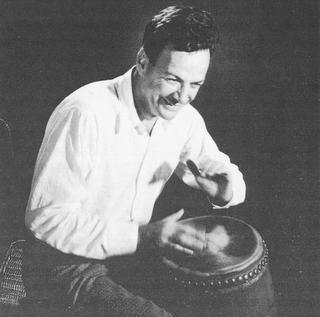 Estoy leyendo un librito muy interesante. Su autor es Richard Feynman, físico de profesión, premio nobel en 1965, pero fudamentalmente un espírutu muy curioso. En la foto de arriba se lo ve tocando el bongo, una de sus tantas pasiones. Además de física, escribía libros de pensamientos, sin ninguna fórmula matemática! Transcribo una muy linda cita sobre la ignorancia como disparadora de nuevas ideas:
Estoy leyendo un librito muy interesante. Su autor es Richard Feynman, físico de profesión, premio nobel en 1965, pero fudamentalmente un espírutu muy curioso. En la foto de arriba se lo ve tocando el bongo, una de sus tantas pasiones. Además de física, escribía libros de pensamientos, sin ninguna fórmula matemática! Transcribo una muy linda cita sobre la ignorancia como disparadora de nuevas ideas:If we were not able or did not desire to look in any new direction, if we did not have a doubt or recognize ignorance, we would not get any new ideas. There would be nothing worth checking, because we would know what is true. So what we call scientific knowledge today is a body of statements of varying degrees of certainty. Some of them are most unsure; some of them are nearly sure; but none of them is absolutely certain. Scientists are used to this. We know that it is consistent to be able to live and not know. Some peole say, "How can you live without knowing?" I do not know what they mean. I always live without knowing. That is easy. How you get to know is what I want to know.
This freedom to doubt is an important matter in the sciences and, I believe, in other fields. It was born of a struggle. It was a struggle to be permited to doubt, to be unsure. And I do not want us to forget the importance of the struggle and, by default, to let the thing fall away. I feel a responsibility as a scientist who knows the great value of a satisfactory philosophy of ingnorance, and the progress made possible by such a philosophy, progress which is the fruit of freedom of thought. I feel a responsibility to proclaim the value of this freedom and to teach that doubt is not to be feared, but that it is to be welcomed as the possibility of a new potential for human beings. If you know that you are not sure, you have a chance to improve the situation. I want to demand this freedom for future generations.
El libro, "The meaning of it all", lo pueden comprar en Amazon. También me gustó mucho este otro.

